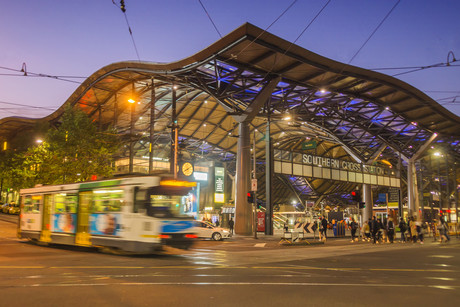Australian cities ranked 'middle of the road' for sustainable transport

Brisbane leads Australia for sustainable and effective transport according to the 2017 Sustainable Cities Mobility Index from design consultancy Arcadis. Hong Kong topped the index and seven out of the top 10 spots went to European cities.
The 2017 Sustainable Cities Mobility Index ranked 100 of the world’s leading cities according to the sustainability and effectiveness of their transport networks. The Index used a triple bottom-line approach of People, Planet and Profit to analyse the cities. The research was undertaken by the Centre for Economics and Business Research (Cebr).
Brisbane was the highest ranked Australian city at 48th, followed by Sydney 51st, Canberra 53rd, Melbourne 55th and Perth 87th. According to the Index, Australian cities were held back due to the effectiveness of their transit networks. Factors such as no functioning metro networks, low uptake of public transport, heavy reliance on roads and private vehicles, as well as poor uptake of active commuting options all resulted in Australian cities scoring poorly across sustainability and effectiveness measures.
Despite the relatively low ranking of Australian cities, it’s not all bad news according to Arcadis Managing Director of Infrastructure in Australia Pacific Phil Kajewski.
“Australia’s cities largely all ranked middle of the road for the sustainability of their transport. This doesn’t mean that we are doing poorly, just that we can do better.
“We’ve seen significant infrastructure investment over the past year, with projects underway such as metro rail in Sydney and Melbourne, and major roads like NorthLink in WA.
“The benefits from these massive transit projects are yet to be realised. All the top global cities have integrated mobility systems including metro, light-rail, bus and road — many have had metros for years.
“For Australian cities to continue to remain globally competitive and mobile we must continue to invest in a range of road and public transport projects, ensure transport planning for these projects is strongly linked to land-use planning and do what we can in this planning to encourage mixed-mode journeys that include active mobility, such as walking and cycling.”
Arcadis found the top ranked city, Hong Kong, was boosted by its innovative and well-connected metro network and a high share of trips taken by public transport. Hong Kong managed to achieve many of the aims of an effective urban transport system — enabling comprehensive mobility, creating economic opportunity and enriching the lives of citizens, business and tourists alike.
European cities dominated the rankings, with seven of the top 10 spots. According to the report, European cities benefited from established and well-used metro networks such as London’s Underground, strong bicycle infrastructure in cities like Amsterdam and Copenhagen, and high shares of commuters using public rather than private transport. The report also found that European cities are more environmentally conscious, with incentives to lower emissions reflected in cleaner air and greener mobility systems.
The report also found that cities benefiting from ‘money, mass or maturity’, namely high-wealth, significant global cities, do not necessarily lead the ranking in sustainable urban mobility. Although these factors can help, wealthy, large and/or older cities were not “automatically punching their ticket to sustainable urban mobility” according to the report.
The Sustainable Cities Mobility Index explored the three pillars of sustainability: social (people), environmental (planet) and economic (profit) to develop an indicative ranking of how sustainable urban mobility systems are in 100 of the world’s leading cities. It looked at how sustainable each of the cities are in terms of the social and human implications, environmental impacts of mobility in the city as well as efficiency and reliability of the cities.
The full copy of the report can be found at http://arcad.is/SCMI.
How to navigate Australia’s new climate regulations
Australia’s new mandatory climate reporting regulations are set to take effect next year,...
A concrete use for carpet fibres
Australian engineers have come up with an unexpected use for discarded carpets: as a means to...
COP29: finance, a "crucial" opportunity and a seat at the table
Leaders and diplomats from around the world are descending on Baku, Azerbaijan, this month for...









